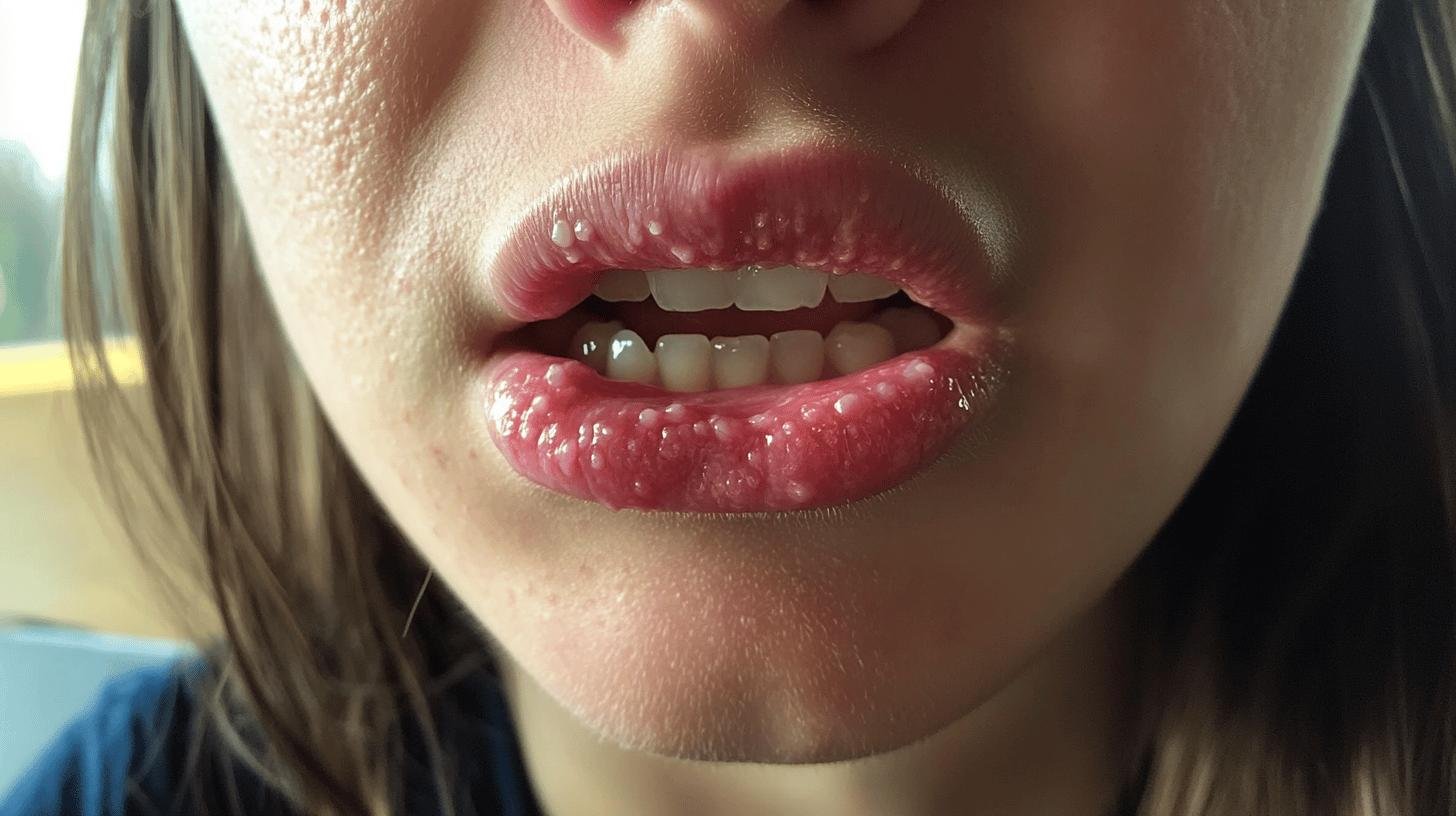TL;DR:
- Autoimmune diseases can cause mouth sores, signalling immune issues.
- Notable diseases impacting oral health include:
- Lupus: Mouth ulcers, joint pain, skin rashes.
- Sjögren’s Syndrome: Dry mouth, increased cavity risk.
- Behcet’s Disease: Recurrent painful mouth ulcers.
- Pemphigus Vulgaris: Blisters and ulcers in the mouth.
- Celiac Disease: Dry mouth, ulcers from inflammation.
- Diagnosis involves symptom patterns, blood tests, and biopsies.
- Management includes good hygiene, hydration, medications, and diet adjustments.
- Stress reduction and lifestyle changes, like avoiding irritants, are effective preventive measures. Regular dental visits are essential for oral health.
Have you ever had a sore pop up in your mouth out of nowhere and just refused to leave? That may be Autoimmune Diseases Mouth Sores. If you’re dealing with an autoimmune disease, those pesky mouth sores can be more than just a minor nuisance—they’re often a hallmark of conditions like lupus or Sjögren’s syndrome. These diseases don’t just complicate life; they also love to mess with your mouth. But don’t worry! We’re diving into effective relief strategies to help you manage these unwelcome guests. Stick around, and let’s tackle those mouth sores together with some friendly advice and easy-to-follow tips.
Understanding Autoimmune Diseases and Mouth Sores
Autoimmune diseases can interfere with our bodies’ function by mistakenly targeting healthy tissues. This can lead to numerous symptoms, including those appearing in the mouth. Mouth sores or ulcers often signal an issue with the immune system. These sores can be painful, making eating, drinking, or speaking difficult.
Lupus and Sjögren’s syndrome are two significant autoimmune diseases affecting oral health. Lupus can cause mouth sores, which often appear during flare-ups and may accompany joint pain or skin rashes.
Sjögren’s syndrome targets the salivary glands, resulting in a dry mouth. This lack of saliva reduces protection against bacteria, increasing the risk of cavities and infections.
Here are more autoimmune diseases that may impact your mouth:
- Behcet’s Disease: Known for recurring, painful mouth ulcers.
- Pemphigus Vulgaris: Causes blisters and ulcers in the mouth, often an early sign.
- Lichen Planus: This leads to painful, burning sensations and white patches.
- Celiac Disease: Causes dry mouth and ulcers due to gluten-related inflammation.
- Systemic Lupus Erythematosus (SLE): Features mouth ulcers as part of its diagnostic profile.
Early diagnosis is crucial. If you notice persistent sores or other unusual symptoms, seek medical advice. Healthcare professionals are vital in diagnosing and managing these issues, so pay attention to the signals from your mouth and act promptly!
Symptoms and Diagnosis of Autoimmune Mouth Sores

Autoimmune mouth sores can be excruciating. These ulcers, dry mouth, and burning sensations indicate possible immune system problems. Lupus often includes mouth ulcers as part of its diagnosis, while Sjögren’s Syndrome can lead to dry salivary glands, causing both dryness and ulcers.
Here’s a summary of symptoms linked to specific autoimmune diseases:
| Disease | Symptoms |
|---|---|
| Lupus | Mouth ulcers, joint pain, skin rashes |
| Sjögren’s Syndrome | Dry mouth, increased cavity risk |
| Behcet’s Disease | Recurrent painful mouth ulcers |
| Pemphigus Vulgaris | Blisters and ulcers in the mouth |
| Celiac Disease | Dry mouth, ulcers due to inflammation |
Diagnosing these conditions isn’t always simple. Doctors look for patterns in symptoms, like recurring ulcers or dryness, that match known autoimmune profiles. Comprehensive medical evaluations, including blood tests and biopsies, are often necessary. If persistent mouth issues arise, consult a healthcare professional to determine the cause.
Management and Treatment Options for Autoimmune Mouth Sores
Managing autoimmune mouth sores requires some lifestyle changes and good oral hygiene. Keeping your mouth clean helps prevent infections that can aggravate sores. Regular brushing, flossing, and using non-alcoholic mouthwash are easy habits to adopt. Staying hydrated is essential, especially for those with Sjögren’s syndrome.
Here’s a toolbox of treatments that may help:
- Medications: Prescriptions can reduce ulcer severity and pain.
- Dental Pastes: New formulations can soothe oral lesions.
- Mouth Rinses: Anti-inflammatory rinses ease discomfort and speed healing.
- Stress Management: Reducing stress can reduce flare-ups and improve health.
- Diet Adjustments: Avoiding spicy or acidic foods prevents irritation.
Direct primary care (DPC) can be a game-changer for managing autoimmune mouth sores. With DPC, you pay a flat fee for various services, making healthcare more accessible. This allows for more personalized care without insurance hassles.
Healthcare professionals are crucial in managing autoimmune conditions. They help create personal treatment plans suited to your needs, offering guidance through ups and downs. Teaming up with a pro can really help manage those mouth sores!
The Role of Nutrition and Lifestyle in Managing Autoimmune Mouth Sores

Have you considered that your diet might worsen mouth sores? Diet plays a large role in oral health. Some foods might trigger canker sores, a common hassle for those with autoimmune conditions. Spicy, acidic, or crunchy foods can irritate the mouth, worsening sores.
Here’s a list of lifestyle changes to reduce sores:
- Stress Management: Keep stress low with activities like yoga or meditation.
- Stay Hydrated: Drink plenty of water for a moist and healthy mouth.
- Avoid Mouth Irritants: Steer clear of spicy and acidic foods.
- Gentle Oral Care: Use a soft-bristled toothbrush and alcohol-free mouthwash.
Regular dental visits and good oral hygiene are very important. Products like Colgate Total Mouthwash fight bacteria and reduce plaque, helping ease mouth sores. Keep brushing, flossing, and visiting your dentist for some well-deserved oral care!
Preventive Measures for Autoimmune Mouth Sores
Prevention is key in managing mouth sores related to autoimmune diseases. Addressing dry mouth and avoiding triggers can reduce discomfort. Regular dental visits and good oral hygiene are vital for maintaining oral health.
Here’s how to prevent those pesky sores:
- Stay Hydrated: Drinking water helps fend off dry mouth, a common sore trigger.
- Gentle Oral Care: Use a soft-bristled toothbrush and avoid harsh mouthwashes to lessen irritation.
- Watch Your Diet: Avoid spicy or acidic foods that can trigger sores and inflammation.
Being proactive can impact the frequency and severity of mouth sores. Maintain good habits and give your mouth the care it deserves!
Final Words
Autoimmune diseases can unexpectedly appear in our lives, especially when they cause pesky mouth sores. We can better manage these symptoms by understanding how conditions like lupus and Sjögren’s syndrome affect our oral health.
Good oral hygiene, a balanced diet, and working closely with healthcare professionals can really help. Making small lifestyle changes and considering direct primary care might be your ticket to feeling better.
These steps not only ease discomfort but can also prevent sores from ruining your day. Stay proactive, and keep those smiles bright!
FAQ
What autoimmune disease causes mouth sores?
Autoimmune diseases like lupus and Behcet’s disease can cause mouth sores. These sores often appear as ulcers and can be painful, highlighting the need for medical evaluation.
What does a lupus mouth sore look like?
A lupus mouth sore looks like a red, painful ulcer. It can appear on the roof of the mouth, inside cheeks, or lips and is often accompanied by a burning sensation.
Which autoimmune disease has oral manifestations?
Autoimmune diseases with oral manifestations include lupus, Sjögren’s syndrome, and pemphigus vulgaris. These conditions commonly cause symptoms like mouth sores, dry mouth, and gum issues.
What disease is associated with mouth sores?
Mouth sores are commonly associated with lupus, Sjögren’s syndrome, and Behcet’s disease. These autoimmune conditions affect oral health and may indicate other health issues.
How can I manage mouth sores from autoimmune diseases?
Managing mouth sores involves good oral hygiene, staying hydrated, and visiting your dentist regularly. Treatments include medications, dental pastes, and lifestyle changes like stress management.
What role do nutrition and lifestyle play in managing mouth sores?
Nutrition and lifestyle greatly impact mouth sores. Avoiding dietary triggers, staying hydrated, and managing stress can reduce symptoms. Regular dental care and using supportive oral products are beneficial.
How can I prevent mouth sores from autoimmune diseases?
Preventing mouth sores focuses on managing stress, maintaining oral hygiene, and avoiding known triggers. Regular dental check-ups help keep oral health in check, mitigating the impacts of autoimmune conditions.

